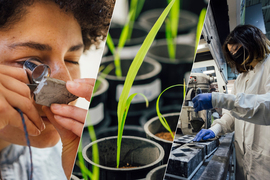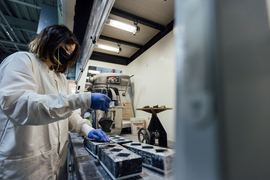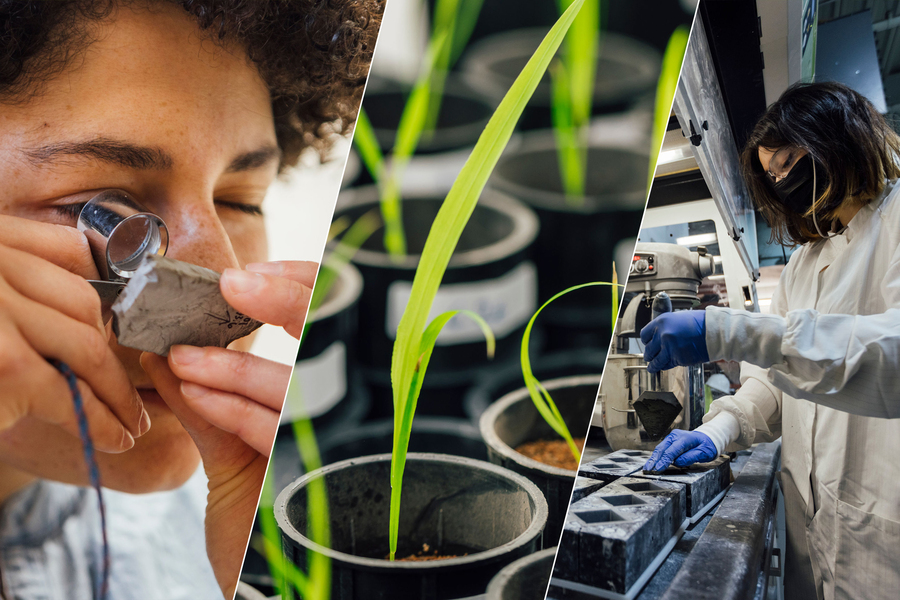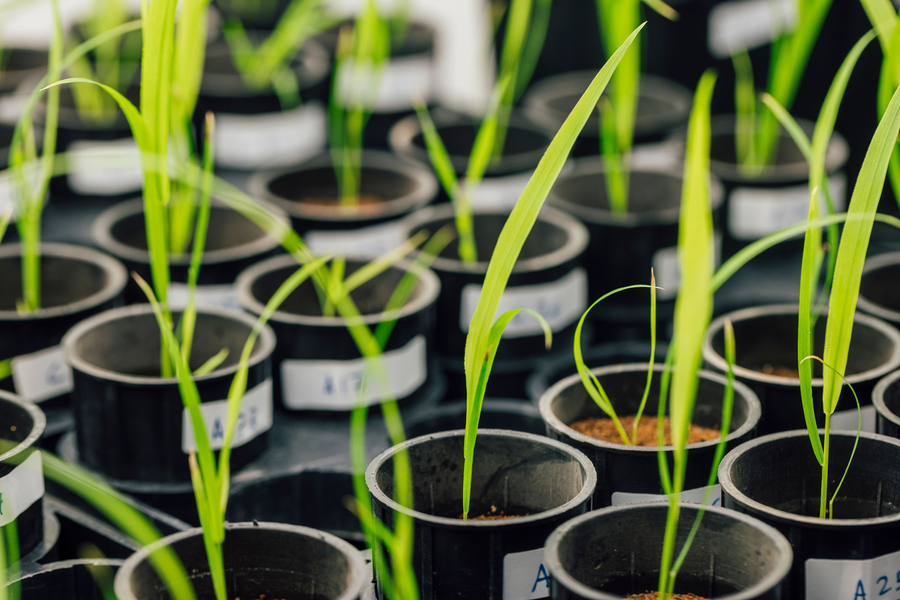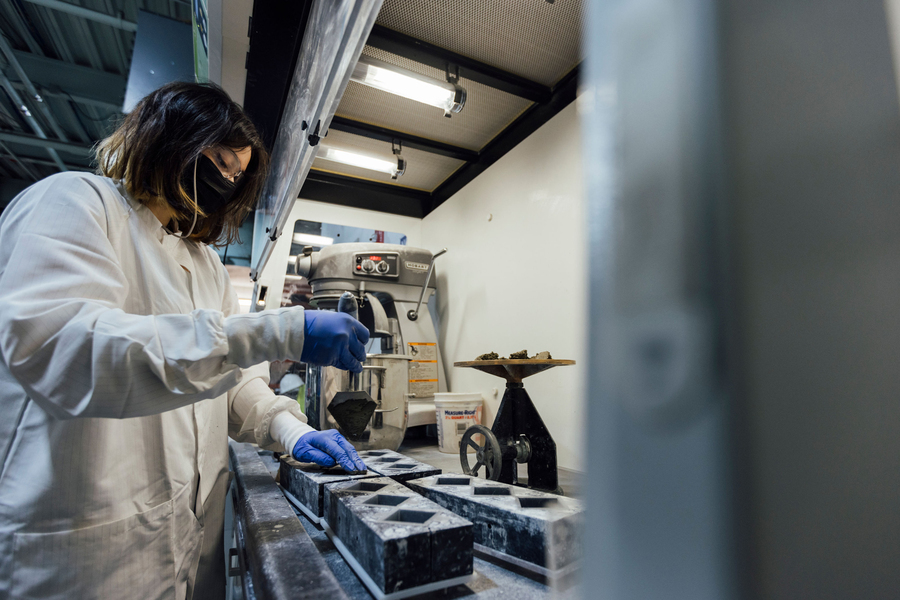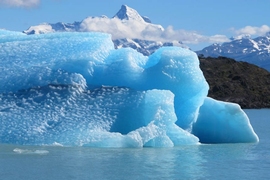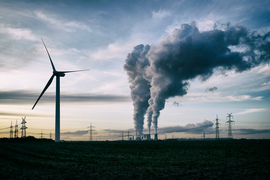MIT today announced the five flagship projects selected in its first-ever Climate Grand Challenges competition. These multiyear projects will define a dynamic research agenda focused on unraveling some of the toughest unsolved climate problems and bringing high-impact, science-based solutions to the world on an accelerated basis.
Representing the most promising concepts to emerge from the two-year competition, the five flagship projects will receive additional funding and resources from MIT and others to develop their ideas and swiftly transform them into practical solutions at scale.
“Climate Grand Challenges represents a whole-of-MIT drive to develop game-changing advances to confront the escalating climate crisis, in time to make a difference,” says MIT President L. Rafael Reif. “We are inspired by the creativity and boldness of the flagship ideas and by their potential to make a significant contribution to the global climate response. But given the planet-wide scale of the challenge, success depends on partnership. We are eager to work with visionary leaders in every sector to accelerate this impact-oriented research, implement serious solutions at scale, and inspire others to join us in confronting this urgent challenge for humankind."
Brief descriptions of the five Climate Grand Challenges flagship projects are provided below.
Bringing Computation to the Climate Challenge
This project leverages advances in artificial intelligence, machine learning, and data sciences to improve the accuracy of climate models and make them more useful to a variety of stakeholders — from communities to industry. The team is developing a digital twin of the Earth that harnesses more data than ever before to reduce and quantify uncertainties in climate projections.
Research leads: Raffaele Ferrari, the Cecil and Ida Green Professor of Oceanography in the Department of Earth, Atmospheric and Planetary Sciences, and director of the Program in Atmospheres, Oceans, and Climate; and Noelle Eckley Selin, director of the Technology and Policy Program and professor with a joint appointment in the Institute for Data, Systems, and Society and the Department of Earth, Atmospheric and Planetary Sciences
Center for Electrification and Decarbonization of Industry
This project seeks to reinvent and electrify the processes and materials behind hard-to-decarbonize industries like steel, cement, ammonia, and ethylene production. A new innovation hub will perform targeted fundamental research and engineering with urgency, pushing the technological envelope on electricity-driven chemical transformations.
Research leads: Yet-Ming Chiang, the Kyocera Professor of Materials Science and Engineering, and Bilge Yıldız, the Breene M. Kerr Professor in the Department of Nuclear Science and Engineering and professor in the Department of Materials Science and Engineering
Preparing for a new world of weather and climate extremes
This project addresses key gaps in knowledge about intensifying extreme events such as floods, hurricanes, and heat waves, and quantifies their long-term risk in a changing climate. The team is developing a scalable climate-change adaptation toolkit to help vulnerable communities and low-carbon energy providers prepare for these extreme weather events.
Research leads: Kerry Emanuel, the Cecil and Ida Green Professor of Atmospheric Science in the Department of Earth, Atmospheric and Planetary Sciences and co-director of the MIT Lorenz Center; Miho Mazereeuw, associate professor of architecture and urbanism in the Department of Architecture and director of the Urban Risk Lab; and Paul O’Gorman, professor in the Program in Atmospheres, Oceans, and Climate in the Department of Earth, Atmospheric and Planetary Sciences
The Climate Resilience Early Warning System
The CREWSnet project seeks to reinvent climate change adaptation with a novel forecasting system that empowers underserved communities to interpret local climate risk, proactively plan for their futures incorporating resilience strategies, and minimize losses. CREWSnet will initially be demonstrated in southwestern Bangladesh, serving as a model for similarly threatened regions around the world.
Research leads: John Aldridge, assistant leader of the Humanitarian Assistance and Disaster Relief Systems Group at MIT Lincoln Laboratory, and Elfatih Eltahir, the H.M. King Bhumibol Professor of Hydrology and Climate in the Department of Civil and Environmental Engineering
Revolutionizing agriculture with low-emissions, resilient crops
This project works to revolutionize the agricultural sector with climate-resilient crops and fertilizers that have the ability to dramatically reduce greenhouse gas emissions from food production.
Research lead: Christopher Voigt, the Daniel I.C. Wang Professor in the Department of Biological Engineering
“As one of the world’s leading institutions of research and innovation, it is incumbent upon MIT to draw on our depth of knowledge, ingenuity, and ambition to tackle the hard climate problems now confronting the world,” says Richard Lester, MIT associate provost for international activities. “Together with collaborators across industry, finance, community, and government, the Climate Grand Challenges teams are looking to develop and implement high-impact, path-breaking climate solutions rapidly and at a grand scale.”
The initial call for ideas in 2020 yielded nearly 100 letters of interest from almost 400 faculty members and senior researchers, representing 90 percent of MIT departments. After an extensive evaluation, 27 finalist teams received a total of $2.7 million to develop comprehensive research and innovation plans. The projects address four broad research themes:
- Building equity and fairness into climate solutions
- Decarbonizing complex industries and processes
- Removing, managing, and storing greenhouse gases
- Using data and science to forecast climate-related risk
To select the winning projects, research plans were reviewed by panels of international experts representing relevant scientific and technical domains as well as experts in processes and policies for innovation and scalability.
“In response to climate change, the world really needs to do two things quickly: deploy the solutions we already have much more widely, and develop new solutions that are urgently needed to tackle this intensifying threat,” says Maria Zuber, MIT vice president for research. “These five flagship projects exemplify MIT’s strong determination to bring its knowledge and expertise to bear in generating new ideas and solutions that will help solve the climate problem.”
“The Climate Grand Challenges flagship projects set a new standard for inclusive climate solutions that can be adapted and implemented across the globe,” says MIT Chancellor Melissa Nobles. “This competition propels the entire MIT research community — faculty, students, postdocs, and staff — to act with urgency around a worsening climate crisis, and I look forward to seeing the difference these projects can make.”
“MIT’s efforts on climate research amid the climate crisis was a primary reason that I chose to attend MIT, and remains a reason that I view the Institute favorably. MIT has a clear opportunity to be a thought leader in the climate space in our own MIT way, which is why CGC fits in so well,” says senior Megan Xu, who served on the Climate Grand Challenges student committee and is studying ways to make the food system more sustainable.
The Climate Grand Challenges competition is a key initiative of “Fast Forward: MIT’s Climate Action Plan for the Decade,” which the Institute published in May 2021. Fast Forward outlines MIT’s comprehensive plan for helping the world address the climate crisis. It consists of five broad areas of action: sparking innovation, educating future generations, informing and leveraging government action, reducing MIT’s own climate impact, and uniting and coordinating all of MIT’s climate efforts.
